- Faculty News
- Student News
- Lab News
- Publications
- Meetings and Presentations
- Outreach
- Grants
- Announcements
- About This Newsletter
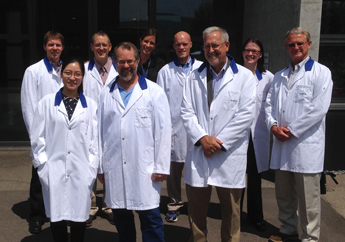
ABOVE: Dr. Billy Crow and Tina Gu (front left) visit the Syngenta Lawn and Garden research and development facilities in Basel and Stein, Switzerland.
Award winners at the 97th annual meeting of the Florida Entomological Society
Lifetime Achievement Award in Florida Entomology, Dr. John Capinera
Annual Achievement Award for Extension, Dr. Faith Oi
Annual Achievement Award for Teaching, Dr. Pasco Avery
 Media highlighting research by Dr. Barry Alto.
Media highlighting research by Dr. Barry Alto.
Climate, genetics can affect how long virus-carrying mosquitoes live.
 Dr. Daniel Carrillo, Dr. Jose C. Rodrigues and Dr. Jorge E. Peña organized two symposia "Prospects for control of red palm mite ten years after its invasion of the Neotropics" and "False spider mites and their impact on global agriculture and trade" at the XIV International Congress of Acarology held in Kyoto, Japan, July 13-11, 2014. Thirteen acarologists, representing the USA (3), Brazil (3), Mexico (2), the United Kingdom (1), Australia (1), Venezuela (1), and Colombia (1) presented papers. The symposia was followed by a one-hour discussion addressing future research needs for Tenuipalpidae.
Dr. Daniel Carrillo, Dr. Jose C. Rodrigues and Dr. Jorge E. Peña organized two symposia "Prospects for control of red palm mite ten years after its invasion of the Neotropics" and "False spider mites and their impact on global agriculture and trade" at the XIV International Congress of Acarology held in Kyoto, Japan, July 13-11, 2014. Thirteen acarologists, representing the USA (3), Brazil (3), Mexico (2), the United Kingdom (1), Australia (1), Venezuela (1), and Colombia (1) presented papers. The symposia was followed by a one-hour discussion addressing future research needs for Tenuipalpidae.
 Dr. Turner Announces 2014-15 Roche Teaching Fellows
Dr. Turner Announces 2014-15 Roche Teaching Fellows
Dr. Elaine Turner, CALS Dean, is pleased to announce the 2014-2015 cohort of six CALS Roche Teaching Fellows. Roche Teaching Fellows have committed to undertaking a teaching experiment in one of their courses over the next academic year and will present the results at the 2015 CALS Teaching Enhancement Symposium. Funding for the Roche Teaching Fellows is provided by the Marion C. Roche and Virginia T. Roche Faculty Excellence Fund.
Dr. Rebecca Baldwin was chosen as a Roche Teaching Fellow. Her project is titled "Bugs and People: Using insects to promote active participation in a general education biology class."
 Dr. Billy Crow and his graduate student Tina Gu, along with colleague Dr. Bruce Martin and his graduate student Brad Shaver from Clemson University, were invited to spend a week in Switzerland as guests of Syngenta Lawn and Garden. They each made presentations of their research with Syngenta chemistries and learned a great deal about the pesticide business.
Dr. Billy Crow and his graduate student Tina Gu, along with colleague Dr. Bruce Martin and his graduate student Brad Shaver from Clemson University, were invited to spend a week in Switzerland as guests of Syngenta Lawn and Garden. They each made presentations of their research with Syngenta chemistries and learned a great deal about the pesticide business.
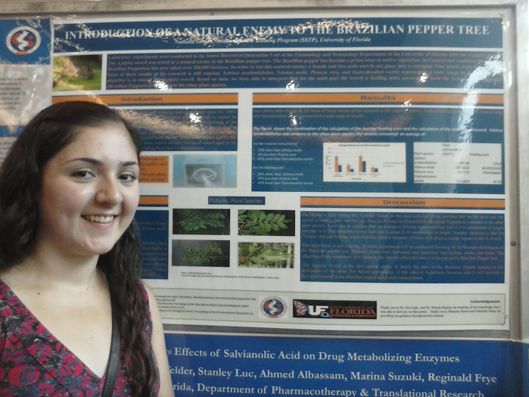
ABOVE: Ms. Nathalia Gomez, a high school student who is participating in the 56th Annual Student Science Summer Training Program by completing a research project in the Cuda lab, presented a poster on her research at the close-out ceremony for the program. The poster was entitled "Introduction of a natural enemy to the Brazilian pepper tree."
 Members of Dr. Nan-Yao Su's termite lab set up camp with their termites and other insects at the Museum of Science and Discovery in Ft. Lauderdale for their butterfly release weekend, August 2nd and 3rd. Children and their parents excitedly watched termites travel their tunnels, answered trivia about subterranean termites, checked out some cool insect boxes, and played with creepy crawlies.
Members of Dr. Nan-Yao Su's termite lab set up camp with their termites and other insects at the Museum of Science and Discovery in Ft. Lauderdale for their butterfly release weekend, August 2nd and 3rd. Children and their parents excitedly watched termites travel their tunnels, answered trivia about subterranean termites, checked out some cool insect boxes, and played with creepy crawlies.
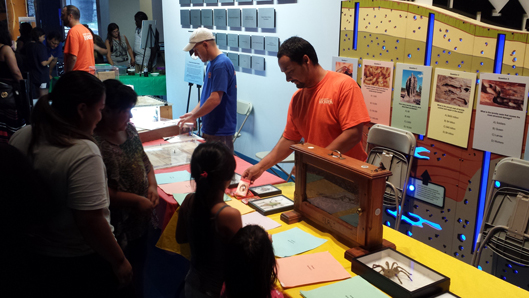
ABOVE: Pictured left to right, Aaron Mullins, Ron Pepin, and John Zukowski talk to visitors about termites and other insects at the Museum of Discovery and Science.

Ms. Julie Baniszewki, a former undergraduate student who completed her honors project with Dr. James P. Cuda and worked in the department with Dr. Emma Weeks and Dr. Drion Boucias, won second overall student paper at the Aquatic Plant Societies Annual Meeting 2014 held in Savannah, Georgia, July 13-16th. Julie is now working towards her Master's degree at the University of Kentucky but took time out to present her honors project research on "Hydrilla biological control: Optimizing the hydrilla tip mining midge."

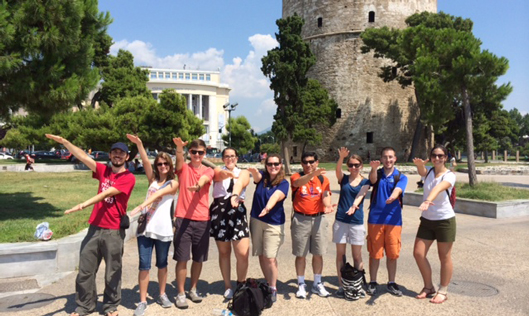
ABOVE: Our Entomology Study Abroad class in Thessaloniki, Greece, studying agritourism and medical entomology. From left to right standing in front of the White Tower in Thessaloniki, Greece. Andre Sigal-Szejner, Stefani Harrison, Austin Stevens, Kristen Donovan, Dr. Rebecca Baldwin, Dr. Roberto Pereira, Abby Griffin, Sean Ferguson, and Kate McIver.
 Tina Gu successfully defended her M.S. thesis "The efficacy of potential nematicides for golf courses in Florida."
Tina Gu successfully defended her M.S. thesis "The efficacy of potential nematicides for golf courses in Florida."
Need to name that bug? A host of experts are available to help Floridians identify any insect or related arthropod. If a mystery creature has six or more legs, the UF Insect ID Lab is the place to call.
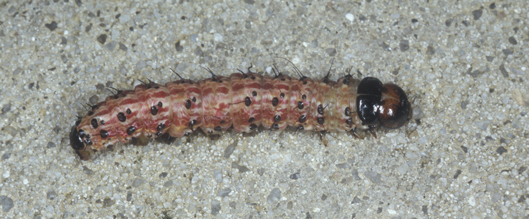
ABOVE: One of Florida’s unusual household pests is the cabbage palm caterpillar. The larvaefeed on the flower stalks of cabbage palms but often wander off the tree when they are ready to pupate. People often find them on their driveway or even inside their home. The caterpillars have a few habits that do not endear them to homeowners. When crawling on a house, they may release an orange or brown liquid that stains the siding. If they get indoors, they may chew up fabric fibers from rugs, furniture, curtains, etc. to construct their cocoons.
Lyle Buss is the Insect ID Lab manager.
 Think it might be a nematode problem? The Nematode Assay Laboratory serves Florida and other states by providing nematode assays and expert advice regarding nematode management.
Think it might be a nematode problem? The Nematode Assay Laboratory serves Florida and other states by providing nematode assays and expert advice regarding nematode management.
Since January 2014, the lab has processed and diagnosed a total of 2,047 extension and 584 research samples.
The Nematode Assay Lab was awarded a total of $62,500 to study the virulence and molecular analysis of in vitro produced Pasteuria penetrans isolates from Syngenta and a total of $23,000 from various donors for molecular and isolation study of various root-knot nematodes.
For more information on the Nematode Assay Laboratory please contact the lab manager Dr. Tesfa Mengistu.
Abebe E, Mengistu T, Decraemer W. 2014. E-typing for nematodes: An assessment of type specimen use by nematode taxonomists with a summary of types deposited at the Smithsonian Nematode Collection. Nematology 12: 714-735.
Crow WT. 2014. Turfgrass nematicide and bionematicide research in Florida. Outlooks on Pest Management 25: 222-225.
Crow WT. 2014. A new nematicide for turfgrass. Golf Course Management 82: 84-88.
Davis TS, Abatzoglou JT, Bosque NA, Halbert SE, Pike KS, Eigenbrode SE. 2014. Differing contributions of density dependence and climate to the population dynamics of three eruptive herbivores. Ecological Entomology DOI: 10.1111/een.12134.
Gillett-Kaufman JL, Leitze V-U, Bradshaw JP, Gioeli KT. 2014. Hydrilla infestations in Florida freshwater bodies: How results from a management needs assessment survey helped develop suitable information delivery platforms. Journal of Extension 52(3) Article 3R1B2. Available at: http://www.joe.org/joe/2014june/rb2.php
Gökçe A, Stelinski LL, Nortman DR, Bryan WW, Whalon ME. 2014. Behavioral and electroantennogram responses of plum curculio, Conotrachelus nenuphar, to selected noxious plant extracts and insecticides. Journal of Insect Science 14: Article 90.
Lewis DS, Sperling FA, Nakahara HS, Cotton AM, Kawahara AY, Condamine FL. 2014. Role of Caribbean Islands in the diversification and biogeography of Neotropical Heraclides swallowtails. Cladistics 1096-0031 DOI: 10.1111/cla.12092.
Sourakov A. 2014. Methods for fast moth surveys and notes on species encountered in Vietnam. News of Lepidopterists’ Society 56: 51-57.
Sourakov A. 2014. On the polymorphism and polyphenism of Automeris io (Lepidoptera: Saturniidae) in north Florida. Tropical Lepidoptera Research 24: 52-59.
Wang D, Bowman DD, Brown HE, Harrington LC, Kaufman PE, McKay T, Nelson CT, Sharp J, Lund R. 2014. Key factors influencing canine heartworm (Dirofilaria immitis) prevalence. Parasites and Vectors 7: 264. DOI:10.1186/1756-3305-7-264.
 New on Featured Creatures:
New on Featured Creatures:
A parasitoid wasp, Cotesia congregata (Say) Authors: Christopher D. Crockett, Andrea Lucky, Oscar E. Liburd, Entomology and Nematology Department, University of Florida; Karen M. Kester,Virginia Commonwealth University
Do you have a favorite creature? Learn how to make it into a Featured Creature!
Dr. Phil Kaufman delivered two presentations at the Livestock Insect Workers’ Conference in San Diego, CA. The first was titled "The Cow•Vac: A new tool for filth fly management on commercial dairies in Florida” describing his laboratory's work with an innovative non-chemical control device that vacuums flies from cattle.
The second presentation, which included co-authors Dr. Andrew Li, Dr. Xing Ping Hu, and Dr. Jerry Hogsette (USDA-CMAVE), detailed their recent trip to the People’s Republic of China and was titled "Scientific and technological exchange between the U.S.A. and the People’s Republic of China to mitigate the impact of biting and nuisance flies and their associated diseases."
 Dr. Billy Crow was a speaker at the Northwest Florida Turf Field Day in Jay on June 18th.
Dr. Billy Crow was a speaker at the Northwest Florida Turf Field Day in Jay on June 18th.
Dr. Billy Crow conducted a half-day turfgrass nematode workshop for employees of Quali-Pro at the PSREU in Citra on June 17th.
Dr. Billy Crow conducted a lawn nematode training for landscape staff at The Villages on June 20th.
 Dr. James P. Cuda attended the 97th Annual Meeting of the Florida Entomological Society held in Jupiter, FL, 3-6 August. Cuda presented a poster titled "Effect of plant sex (dioecism) on the performance of Apocnemidophorus pipitzi (Coleoptera: Curculionidae), a stem boring weevil of Brazilian peppertree, Schinus terebinthifolia."
Dr. James P. Cuda attended the 97th Annual Meeting of the Florida Entomological Society held in Jupiter, FL, 3-6 August. Cuda presented a poster titled "Effect of plant sex (dioecism) on the performance of Apocnemidophorus pipitzi (Coleoptera: Curculionidae), a stem boring weevil of Brazilian peppertree, Schinus terebinthifolia."
Dr. James P. Cuda was an invited speaker for the 2014 statewide polycom Great Weed Control CEU Round-Up on 9 July. Cuda gave a presentation titled "Integrating biological controls and herbicides." In total, 18 counties participated in the workshop, which was sponsored by the Florida Turfgrass Association and UF/IFAS.
From the Outreach Coordinator
The live critters are always a hit with children and adults alike. The critters are available for you to check out should you be leading an outreach event. We have doubles of our most popular critters, as well as various native insect species depending on the time of year. We have large wood and Plexiglas cages for viewing our native orb weaving spiders. There is one travel cage and one larger static cage. Please be sure to contact us and review the protocol on transporting and handling the critters if you are not already familiar with it. If you lead an outreach, be sure to fill out a documentation form so your event can be included in the newsletter and we can log all outreach events.
If you would like to schedule an event or have any outreach questions, go to the Outreach pages on our Bug Club Website and contact us.
- Stephanie Stocks, Outreach Coordinator
- Office number 352-273-3958
 Getting social!
Getting social!
We have several social media sites for the Entomology & Nematology Department. To make them easily searchable, all three (YouTube, Facebook and Twitter) have the same page name: UFEntomology. Please share these links with past students or colleagues who may have an interest in departmental activities.
Virni Mattson, our grants specialist, reports that from May 1st to June 30th our external funding for all Entomology & Nematology faculty (in Gainesville and at RECs) was $1,247,246.00. This is for 16 new awards and does not reflect money returned by PIs for project reductions.
- Need to write a research paper but don’t know where to begin? Check out the Entomology Research Guide to get started: http://guides.uflib.ufl.edu/entomology
- 3D printing is now available! The cost is $0.06/gram + $0.02/minute with a $3 minimum charge (major credit card only). Just bring your .stl file on a flash drive to the service desk. This service is first come, first serve so please plan ahead! For more information, please see our guide: http://guides.uflib.ufl.edu/3dprinter
- 3D scanning will be available early in the fall semester. Details forthcoming.
- The renovation of the first floor of Marston will be completed before the start of the fall semester. The first floor will include a computer lab, 3D scanner, plotter, color printer, two black and white printers, a Plenar visualization wall, video conferencing, and a MADE@UF room (Mobile App Development Environment). Training will be required to use the visualization wall. Reservations will be required for the video conferencing room and the visualization wall room.
- Reserve a study room! At the start of the fall semester, Marston will have 26 study rooms for students. Be sure to make a reservation!
Workshops:
- Library Resources @ Marston: 3D printing, visualization wall, research assistance, developing collections for your department.
- Understanding the research process (grad students).
- Responsible Conduct of Research (i.e., research misconduct, mentoring, authorship, peer review) http://guides.uflib.ufl.edu/stemrcr
- Data Management Planning (for grants), and using the Data Management Tool.
- Endnote/RefWorks citation tools (great resource for graduate students, post-docs and faculty).
As your librarian liaison, it is Michelle's goal to support the research and curriculum of the Entomology/Nematology Department and RECs. Please feel free to contact her anytime.
Michelle Leonard
Associate University Librarian
Environmental Engineering Sciences & Natural Resources
Marston Science Library
University of Florida
mleonard@uflib.ufl.edu; 352-273-2866
http://www.uflib.ufl.edu/msl/about/faculty/mleonard.html
We like to share news when it happens using our social media outlets: Twitter, Facebook and YouTube. Follow us on these sites for daily updates! When you send news, we will post it on one or more of these sites and again in the monthly newsletter. Please be sure you have permission from people in photographs you submit for publication.
UF-Bugnews-L listserv subscribers receive notices when issues are posted. Our home page has instructions for subscribing and unsubscribing.
Special thanks to Dr. Verena Lietze and Nancy Sanders, who reviewed the newsletter for errors, and to Jane Medley and Don Wasik, who built the web page design.